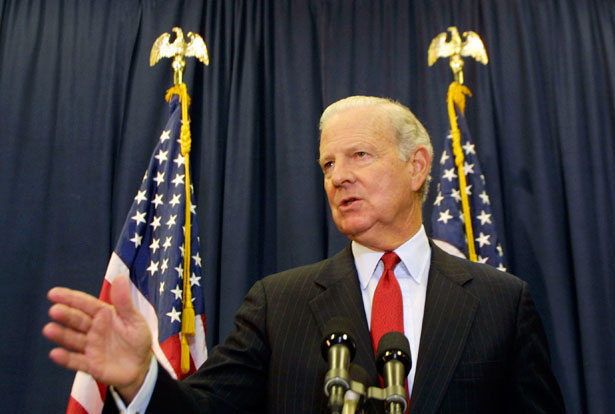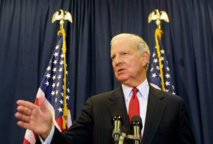"The essence of diplomacy is to build permanent relationships," said Henry Kissinger, the doyen of American foreign policy who played a role in the opening up of communist China during his years as secretary of state from 1969 to 1977.
"It is essential to create confidence so when the difficult issues come up and... decisions have to be made, there is a basis on which minds can be made (up)," the still-sprightly 91-year-old told the gathering.
"It is essential for diplomacy to deal with people before you need them, so that they have faith in what you are saying when you do need them."
He was speaking as President Barack Obama has come under fire for a piecemeal foreign policy which critics say has failed to deal with the upheavals of the Arab Spring -- including the ensuing civil war in Syria and the growth of Islamic militant movements in the Middle East.
Hillary Clinton, who had the tough job of rebuilding the US global image after the presidency of George W. Bush, stressed: "At a time when there are those who wonder about our role in the world, this center sends an important -- indeed, an indispensable -- message: that diplomacy and development are the heart of America's leadership."
"No matter what political upheaval or crisis the world faces, diplomacy never sleeps," agreed James Baker, 84, who was the top US diplomat from 1989 to 1992.
"During tough times like today, as crisis brews in Ukraine, the entire Middle East burns, tensions rise in the Far East and terrorism grows stronger not weaker, diplomacy is going to play an important role in peacefully resolving many of the challenges that we face," Baker argued.
"As a result, the better educated that Americans are about this nation's diplomacy the more effectively our leaders can engage on the world stage to find sound solutions."
Kerry, Kissinger, Baker and Clinton were also joined by Madeleine Albright and Colin Powell.
- 'American DNA' -
The museum, which will be a state-of-the-art glass pavilion providing a public entrance to the State Department in downtown Washington, will house exhibits tracing the history of American diplomacy and how it has shaped the country.
It will remind us "of the great diplomats in our past, and it will remind us as well... of the importance of diplomacy in our future," said Baker.
Kerry argued that the lessons of the past warned against any move towards isolationism.
"I can tell you for certain, most of the world does not lie awake at night worrying about America's presence. They tell me that they worry about what would happen in our absence," Kerry said.
"So as we write the next chapter of American diplomatic history, as we think about how tomorrow's diplomats will fill the exhibit halls of this museum, we have to remember: engagement and leadership -- not retrenchment and isolationism -- are the American DNA."
----------------------------------------------------------------------------------------
"It is essential to create confidence so when the difficult issues come up and... decisions have to be made, there is a basis on which minds can be made (up)," the still-sprightly 91-year-old told the gathering.
"It is essential for diplomacy to deal with people before you need them, so that they have faith in what you are saying when you do need them."
He was speaking as President Barack Obama has come under fire for a piecemeal foreign policy which critics say has failed to deal with the upheavals of the Arab Spring -- including the ensuing civil war in Syria and the growth of Islamic militant movements in the Middle East.
Hillary Clinton, who had the tough job of rebuilding the US global image after the presidency of George W. Bush, stressed: "At a time when there are those who wonder about our role in the world, this center sends an important -- indeed, an indispensable -- message: that diplomacy and development are the heart of America's leadership."
"No matter what political upheaval or crisis the world faces, diplomacy never sleeps," agreed James Baker, 84, who was the top US diplomat from 1989 to 1992.
"During tough times like today, as crisis brews in Ukraine, the entire Middle East burns, tensions rise in the Far East and terrorism grows stronger not weaker, diplomacy is going to play an important role in peacefully resolving many of the challenges that we face," Baker argued.
"As a result, the better educated that Americans are about this nation's diplomacy the more effectively our leaders can engage on the world stage to find sound solutions."
Kerry, Kissinger, Baker and Clinton were also joined by Madeleine Albright and Colin Powell.
- 'American DNA' -
The museum, which will be a state-of-the-art glass pavilion providing a public entrance to the State Department in downtown Washington, will house exhibits tracing the history of American diplomacy and how it has shaped the country.
It will remind us "of the great diplomats in our past, and it will remind us as well... of the importance of diplomacy in our future," said Baker.
Kerry argued that the lessons of the past warned against any move towards isolationism.
"I can tell you for certain, most of the world does not lie awake at night worrying about America's presence. They tell me that they worry about what would happen in our absence," Kerry said.
"So as we write the next chapter of American diplomatic history, as we think about how tomorrow's diplomats will fill the exhibit halls of this museum, we have to remember: engagement and leadership -- not retrenchment and isolationism -- are the American DNA."
----------------------------------------------------------------------------------------









 Home
Home Politics
Politics











